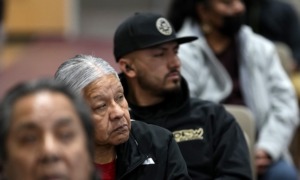Age 20
NEW YOUTH CONNECTIONS, NEW YORK
American history lessons teach us that presidential candidates have, until now, always been white men. So maybe it’s not surprising that this year, as Hillary Clinton faced off against Barack Obama in the Democratic primaries, many voters and media outlets got excited, and turned race and gender into a main focus of the political campaign.
In fact, it appears some voters based their support on these factors. According to the Gallup polling company, 68 percent of black Democrats surveyed nationwide in early February supported Obama, compared with only 35 percent of white Democrats. In January, 48 percent of Democratic women surveyed supported Clinton, compared with 38 percent of Democratic men. These divides suggest voters have flocked to the candidate who shares a part of their identity they consider important.
An article published last January on CNN’s website, highlighted this trend by describing how in South Carolina, African-American women faced a dilemma: Should they vote their race, or should they vote their gender? Angela Jackson, one of the voters interviewed, said she supported Hillary [Clinton] because “she’s a woman, I’m a woman.”
Democratic voter turnout in this year’s primaries was way up, apparently because people were interested in candidates who weren’t the usual white males. Yet I find it comical that people may be motivated to vote only by their candidate’s race or gender, which is a feeble reason for supporting someone.
Our inclination to side with a candidate who shares some part of our identity can distract us from much more important factors that should play into our voting – like the ideas, integrity, leadership and moral worth of a candidate. Most of us today wouldn’t get caught making a racist or sexist comment in public, yet we are willing to side with a candidate based on how he or she resembles us physically.
When we’re swayed by a shared “connection,” not only are we making a decision with very little thought, but we also risk the well-being of our country. If it’s wrong to judge an individual superficially, it’s even worse to evaluate a potential leader on this basis, because there is so much at stake.
We may be tired of white men in the White House, but making external changes won’t improve the country or the world. Real change will occur when a chosen candidate commits to support environmental conservation and other important issues. This kind of president would make a real difference, no matter what his or her race or gender. A woman is no more or less likely to end world pollution just because she has two X chromosomes, and a mixed-race candidate doesn’t necessarily know more about health care.
Only if we choose to see beyond ourselves can we guarantee the best for all. It’s like that old saying our teachers and parents told us when we were young: “Look before you leap.” We should look carefully at all candidates’ policies before we make that “leap” in the voting booth.
©2008 Youth Communications/New York Center Inc., www.youthtcomm.org.






























